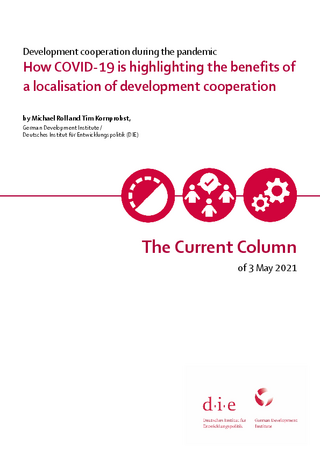Development cooperation during the pandemic
How COVID-19 is highlighting the benefits of a localisation of development cooperation
Roll, Michael / Tim KornprobstThe Current Column (2021)
Bonn: German Development Institute / Deutsches Institut für Entwicklungspolitik (DIE), The Current Column of 3 May 2021
One side effect of the pandemic has been to set in motion a unique global experiment within development cooperation. Field staff were withdrawn from many country offices in the global South in 2020 and recalled to their head offices in Europe and North America. However, the affected development programmes did not necessarily stall. In fact, the opposite happened in some cases. A joint study by international non-governmental organisations and Australia’s La Trobe University, for instance, shows that the withdrawal of field staff from programmes in Oceania has significantly expanded the decision-making space for local stakeholders. When future approaches of governmental and non-governmental development cooperation are discussed, the benefits of this kind of localisation of development cooperation should be taken into account.
Public attention is currently focused primarily on the hardship and economic damage caused by the COVID-19 pandemic. It is undoing the development gains that many countries in the global South and development cooperation have made in recent decades. Additionally, it will now be near impossible to achieve the Sustainable Development Goals (SDGs) within the envisaged time frame. Despite all of this, development cooperation can also learn lessons from local responses to the pandemic. The aforementioned study is a good example. It shows that, as a result of the withdrawal of field staff from development programmes, local expertise and networks have been used more frequently, cooperation between local stakeholders has increased, hierarchies have been reduced, and decision-making has been decentralised. In addition to local staff members of development organisations and their partner organisations, stakeholders at national level have also been more able to influence priorities, as they no longer saw the agenda as being dominated by international experts. According to this study, the changes brought about by the pandemic have indirectly strengthened national and local ownership of development initiatives, something that is difficult to achieve in development cooperation.
The discussion about the benefits of this localisation, usually conducted in the development cooperation community under the heading of “participation”, has been especially intensive in the area of humanitarian aid in recent years. “Localisation” refers to the process of international organisations handing over more decision-making power and resources to local stakeholders. A study of humanitarian aid projects over a three-year period confirms that these projects achieved better outcomes as a result of greater localisation. Initiatives that were led locally to protect refugees in border regions in Myanmar and Tunisia, for instance, were far more effective than international initiatives at integrating people’s informal resources, such as networks of relatives and acquaintances. The study also reveals that many of the concerns associated with greater localisation were unfounded and that the main hindrance to more localisation was the refusal of international organisations to relinquish power. Development researchers are also increasingly recognising that overly strong top-down management by development organisations can hinder the development of ownership and render projects less effective. There is thus a need for new approaches that more actively facilitate and promote local decision-making, input from local experts and the development of locally adapted solutions.
One approach that has already proven effective in the localisation of development cooperation is Problem Driven Iterative Adaptation (PDIA). It is based on the analysis of failed development projects by the Center for International Development at Harvard University. Driven by demand, PDIA guides local partners such as ministries in independently analysing development problems and drawing on their local expertise to develop solution strategies tailored to the specific context. In this process, local partners are also responsible for implementing the agreed steps. The teams then meet regularly to discuss achievements and failures and adapt procedures accordingly. In so doing, they not only learn more about specific reforms but also develop problem-solving skills that they can apply independently in future. PDIA is thus one possible approach for further institutionalising the localisation of development cooperation, the benefits of which have become clear during the pandemic. As well as making development cooperation genuinely more participatory, stronger localisation could also make it more effective and sustainable.


